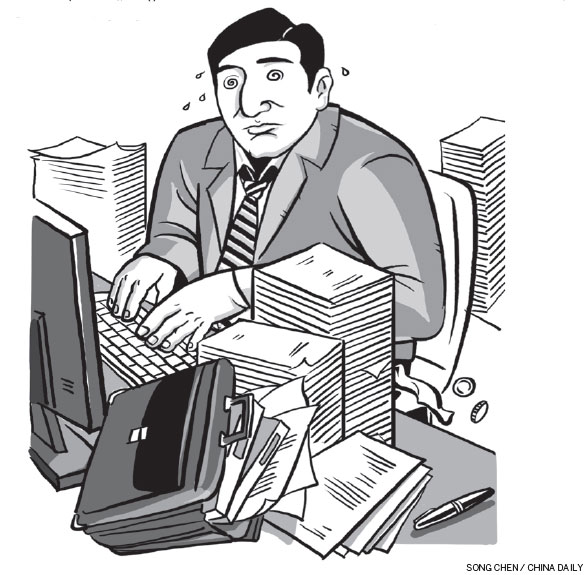Public servants deserve pay rise
The wildly circulated news on the Internet that civil servants salaries are being raised was "confirmed" with the publication of an article in Hong Kong-based Wen Wei Po on Sunday and a positive response from a senior government official a day later.
Citing "authoritative sources", the article in Wen Wei Po, which enjoys a high degree of credibility on the Chinese mainland, gives details of the pay rise of government employees from the bottom to the State level. It quotes a source as saying that pay hikes could now become yearly or two-yearly affair.
At a press conference on Monday, Hu Xiaoyi, vice-minister of human resources and social security, confirmed the increase in public servants' salaries, saying, "the (government) document has been issued to various departments".
The "wage adjustments", a euphemism for "increase in salaries", will be warmly welcomed by China's large army of public servants, especially those at the mid and lower levels who depend entirely on their salaries for a living. It will also mark a big step toward building a normal pay-rise mechanism tuned to national economic growth and prices.
Raising the salaries of public servants has been a sensitive issue for years, especially because the income gap between the rich and poor has not narrowed. Many people believe that a government employee's job is both well-paid and leisurely, not least because apart from their salaries, public servants are seen as a group that enjoys some tempting welfares such as government-subsidized housing, free healthcare and better education for their children. Some people even think government employees also get an opportunity to make money on the side (read bribes).
The fierce competition among college graduates for government posts in recent years and media reports on the "handsome incomes and welfare" employees of monopolistic State departments enjoy have consolidated people's belief that public servants are very well rewarded. And since this has made many ordinary people hostile toward public servants, any news about the latter's pay hike will draw criticism from some netizens and spark an intense debate on the Internet.
Government employees' salaries have not been raised since 2003 even though the prices of consumer products, including essentials - from vegetables and fruits to pork and beef - have risen considerably over the past decade, not to mention the nearly 10-fold increase in housing prices in some big cities. Some government employees' pay checks, accidentally leaked from time to time, also indicate they are not paid as well as many people believe.
It is unfair for civil servants not to be paid according to the importance of the work they do - and especially because the salaries of employees in other fields have increased extensively. The belief that some civil servants in some State departments have access to "gray incomes" apart from their normal salaries does not mean that all government employees, especially the ordinary ones, have illegal sources of income. The country's continuous efforts to fight extravagance and promote frugality and its anti-corruption campaign have plugged many loopholes in the system that allowed civil servants to make illegal money and seek undue welfares.
The government's recent decision to reform government employees' pension system, in which they too will have to pay a certain amount toward their pension funds, also means they will no longer be beneficiaries of a preferential pension scheme. This in a way necessitated the increase in civil servants' salaries, to ensure that they have higher but transparent incomes. As prices keep rising, unchanged salary means the decline of their incomes.
It would be a travesty of social justice to expect a well-educated group to be devoted to its work and be underpaid at the same time.
The author is a senior writer with China Daily.



















